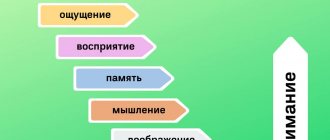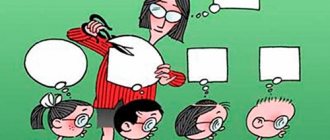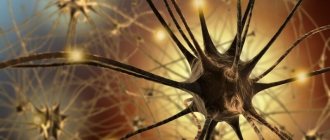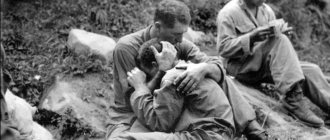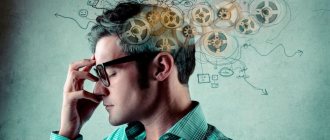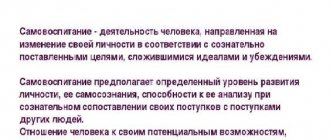The psyche develops under the influence of man’s cognition and transformation of the world around him. Based on his own experience, successes and mistakes, joys and sorrows, the individual creates for himself a model of the world, which becomes the center of his mental life. Cognitive processes form the most massive block in building a model of the world. The main cognitive processes are sensation and perception, attention, thinking, memory, imagination, speech.
Cognitive or mental processes - what are they?
Cognitive (cognitive, mental) processes provide the ability to perceive and process information that comes through the senses from the external environment. The formation of an internal picture of the world and one’s own experience occurs according to a clear algorithm. Information enters the brain and then goes through several stages:
- processing;
- filtration;
- interpretations;
- systematization.
Only after the information is systematized does it go into memory and remain there, becoming experience.
Cognitive processes control human actions. The coordinated work of all components of the cognitive sphere makes it possible to adequately perceive, evaluate and respond to reality. This allows a person to quickly adapt to changing living conditions.
Cognitive processes interact with each other, but can also occur in isolation. Thus, people with speech impairments may have a well-developed ability to perceive auditory signals, and those who have memory problems can easily solve mathematical problems.
The prefrontal cortex and the anterior cingulate cortex are responsible for the coordinated interaction of cognitive processes in the brain. Special tests provide insight into the functionality and consistency of cognitive processes. If they are well developed, a person can:
- show cognitive flexibility - he easily adapts his behavior and thinking to changing environmental conditions and unforeseen situations;
- control your impulsive and automatic reactions;
- act rationally, relying on logical thinking and attention;
- control habitual patterns of behavior, check how well they correspond to the previously formed plan;
- predict events, choose the right ways to achieve your goals;
- store and process information necessary to solve complex tasks;
- make choices based on existing experience and logic;
- draw logical conclusions if there is a problem that needs to be solved.
Cognitive science, cognitome and cognitive ethology
The human brain is the main area of study of the science of knowledge, cognitive science. With a focused study of the brain, some of its capabilities were identified, called cognitive. These are the highest functions of the brain, thanks to which a person is considered an individual: a coherent, consistent and logical flow of thoughts, awareness of oneself as an individual, spatial orientation, the ability to calculate, understand, speak, reason, draw conclusions and direct learning.
To clearly define the totality of cognitive skills of the human brain, Konstantin Vladimirovich Anokhin (a recognized Russian neuroscientist) coined the term “cognitome”. The concept of cognition calls the problem of the brain interdisciplinary: biomedical, technological and existential.
Rapidly deteriorating memory and attention are the main signs of decreased brain function. We can say that this is cognitive “death” for the neurons of the brain, during which dementia almost always inexorably develops. This can be facilitated by constant stress, unhealthy diet, unhealthy lifestyle and tension (nervous or physical).
Man differs from animals in the cognitive functions of his brain. Researchers have often wondered what the cognitive process means for fauna. Cognitive ethology studies the mental perception of animals to answer this question. Until recently, there was frequent debate around this discipline.
What sciences study cognitive processes
Several sciences study cognitive processes:
- psychology (general, developmental, neuropsychology);
- psycholinguistics;
- neurology;
- anthropology.
Scientists began to show a particularly active interest in the study of cognitive processes in the 60s of the last century. The study of cognitive processes continues to this day. The acquired knowledge about cognitive processes is used not only by psychologists, but also by teachers, sociologists, and marketers.
Types of cognitive processes
Cognitive activity is inherent in all living beings. Both animals and humans have basic cognitive functions. More complex processes (speech, thinking, intelligence) are the prerogative of humans.
About lower or basic cognitive processes
The reflection of reality in sensations and perceptions is characteristic of people and animals. The result of reflection in people is sensory images that are very different in their content and functions.
The imaginative sphere of an individual develops exclusively in human forms of activity - in activity, communication, learning. It reflects:
- social living conditions;
- objects created by man;
- nature that humans actively influence.
Animals recreate in their images only biologically significant conditions of existence. Sensory reflection for them is the highest form of orientation in the world. For a person, sensory reflection plays the role of the first and lowest level of cognition, which occurs in the imagination and thinking.
Sensation and perception
The sensation occurs in response to the impact on the sensory organs of stimuli from the external environment. External stimuli (sound, light, cold/heat, etc.) are captured by receptors, and information about them is transmitted to the brain. There it is transformed so that a person has the opportunity to navigate the world.
Sensations reflect the general properties of stimuli, especially if these properties are manifested in a specific object. The quality of sensations depends on the stimuli and the general state of the person’s psyche and nervous system, his attitude, and his tendency to suggestibility. The intensity of sensations depends on the strength of the stimuli, as well as the physical state of the body and the spatiotemporal conditions of perception.
Attention
The environment constantly influences the human senses, but not all stimuli are reflected equally clearly. So, carried away by his work, the worker does not notice what is happening around him - other people are working in the workshop, the mechanisms are rumbling. Of what is in his field of vision, some are perceived clearly, while others recede into the background and are detailed only when necessary.
This example shows how the cognitive process (attention) occurs. It consists in the targeted concentration of consciousness on objects and ensures their clear reflection.
Memory
Everything that a person reflects through the processes of sensation and perception is recorded, organized and stored in the brain, forming an individual experience. If necessary, this experience is used for further activities.
Memory is a series of mental processes as a result of which information is not only perceived, processed, structured and stored, but also becomes available at the right time (remembered). Memory is formed due to the brain’s ability to form temporary neural connections, consolidate and restore traces of earlier impressions.
Processes are complex and higher
This category of processes is unique to humans. The cluster of higher cognitive functions includes those that occur indirectly and voluntarily - intelligence, speech, thinking.
Intelligence (mind)
The concept of “intelligence” refers to the complex of abilities necessary to solve problem situations. Intelligence is formed through the comprehension and fusion of all knowledge acquired by a person into a single block.
There are several theories explaining the concept of “intelligence”. Today, the concept of multiple intelligences, authored by Howard Gardner, is especially popular. The scientist believes that a person has different types of intelligence, which he uses in different life situations.
Gardner identifies the following types of intelligence:
- linguistic, verbal;
- intra- and interpersonal;
- existential
- logical-mathematical;
- musical, spatial-visual;
- kinesthetic.
Modern scientists also focus on the need to develop emotional intelligence. It is necessary for successful communication and adaptation in society.
Thinking
Thinking is the process of indirect and generalized reflection by a person of phenomena and objects of objective reality with their essential features, connections and relationships. This is one of the leading cognitive processes, the highest level of cognition.
Thinking allows a person not only to reflect and understand what he perceives through the senses, but also what is hidden from direct sensory perception. For example, a person cannot feel radioactive radiation, the size of the planet, the speed of light, etc.
Thinking occurs through mental operations - actions with objects, displayed in representations, concepts, phrases. They are formed “in the mind” through speech. A person does not interact with objects directly, does not change their location in space and structure, he does this mentally.
Basic mental operations:
- analysis;
- synthesis;
- comparison;
- abstraction;
- generalization.
| Classification characteristics | Types of thinking |
| Form | scientifically effective scientifically figurative verbal-logical |
| Nature of the tasks to be solved | theoretical practical |
| Level of generalization | empirical theoretical |
| Degree of deployment | discursive intuitive |
| Adequacy of reflection of reality | realistic autistic |
| Degree of novelty and originality | reproductive productive (creative) |
| Impact on the emotional sphere | pathogenic sanogenic |
Speech
Speech is the most important cognitive process that only humans possess. Thanks to the ability to communicate through speech, it constantly enriches the idea of the outside world in the human mind. Psychology views speech as a form of communication and one of the mechanisms of thinking.
A person’s speech develops throughout his life. Communication skills also improve with regular practice. Speech disorders can interfere with communication.
Cognitive distortions (dissonance)
Cognitive dissonance is not just a fancy phrase that only applies to scientists and professors. We ourselves often encounter this .
This is a state in which contradictions arise:
- knowledge;
- opinions;
- beliefs.
During a cognitive distortion, a person experiences confusion, anxiety, awkwardness, stress, feelings of shame and guilt, or even anger - psychological discomfort . For example, there is a beggar sitting in a pedestrian crossing to whom you gave some money. She reaches for them, and an expensive watch is shown on her hand.
You are confused at first because you thought the person needed financial support. But it turns out that he may be richer than you yourself. At first you find yourself in a stupor, which can then turn into aggression because you have been fooled.
Dissonance (what is it?) arises for the following reasons :
- the discrepancy between a person’s knowledge of an object, phenomenon, other people and really what they are;
- discrepancy between the acquired experience and the situation that was repeated, only in a different way;
- discrepancy between personal opinion and the point of view of others, which pops up randomly;
- maintaining traditions and beliefs, if you yourself do not sincerely respect and believe them;
- logical inconsistency of facts.
What to do if this strange cognitive dissonance happens to you? First you need to reduce the significance of this condition. After all, there is an explanation for everything that is simply not available to you at the moment.
To do this, you need to look for new information about the subject of cognitive distortion . Study it in more detail, or talk about it with other people. Perhaps you just had a small piece of knowledge and this was a great opportunity to expand it.
You shouldn't have very constrained beliefs . You must absorb and notice information of various formats, study everything around you. With this approach to life, it is unlikely that anything will surprise or greatly offend. You will simply stumble upon new knowledge that you will immediately take note of.
Functional diagram of the cognitive process
The cognitive process diagram consists of several blocks. They are interconnected by information flows. The scheme of the cognitive process contains automatic and intellectual functions.
The main blocks of the cognitive process diagram:
- Receptors are the zone of primary information analysis;
- Memory - contains tasks and sensory information, participates in cognitive processes;
- Representative is a zone of synthesis of perception, knowledge and images. The representation is formed situationally, automatically and unconsciously. The contents of memory and knowledge systems are used to form representations.
The ability to form representations is innate. It can improve over the course of its life.
Psycholinguistics as a branch of cognitive psychology
Language, reason and mind, their relationship and the resulting operations are the area that is studied by current psycholinguistics.
The solid foundation on which it stands is cognitive psychology. Its conclusions are also useful in other areas of psychology.
Psycholinguistics, as a field of linguistics, describes speech messages, the extraction of their meaning, speech activity (both in isolation from mental functions and in close connection with them), and analysis of the progress of speech associated with the formation of personality.
Cognitive processes in educational activities
Many learning theories recognize the importance of cognitive processes. During study, all cognitive processes are maximally involved. To get the desired result from studying, you have to put in effort and time.
Cognitive processes in learning to read
To read, a person needs to know letters and sounds, be focused, remember and understand the words he is reading. It is also important to relate what you read to your existing experience.
Depending on the task that the reader sets for himself, he can process information differently. For example, when he reads a novel to have a good time or studies from a textbook for an exam.
Cognitive processes in writing
When writing text, the same cognitive processes are involved as in the case of reading. A person writing needs to remain focused, ignore extraneous stimuli, and monitor the legibility of letters, spelling and punctuation.
Before you start writing, you need to draw up a plan for the text, think through the content so that readers understand it.
Ways to improve cognitive processes
Cognitive abilities can be developed at any age. Simple recommendations will help with this.
- Take care of your health. General well-being and the state of the nervous system are directly related to the quality of cognitive processes. Productivity decreases if a person leads an unhealthy lifestyle or suffers from lack of sleep. Pathologies of the cardiovascular, nervous system and other health problems can also lead to a decrease in mental abilities.
- Use brain trainers. Special computer programs, logical tasks, puzzles - all this develops cognitive abilities. On the Internet you can find simulators with interesting tasks designed to develop attention, memory, perception, and speech in children and adults.
- Focus on successes. This is necessary to strengthen self-esteem and notice progress towards your goal. Even if you notice your own weaknesses and mistakes, it is important to believe in your own strengths and continue to improve yourself.
- Think critically. The habit of questioning information and seeking confirmation from authoritative sources helps you become independent and increase your level of competence. Critical thinking helps to think deeply, determine the relationship between events and facts, and analyze them.
- Read a lot. Reading activates many cognitive processes, gives pleasure, and serves as a source of new knowledge. Reading is an easy and enjoyable way to develop concentration, memory, language and imagination.
- Get creative. Write stories, draw, sculpt, dance and sing. Whatever creative activity you do, it develops cognitive abilities. Creativity improves concentration, the ability to find solutions in unusual situations, relaxation, broadens one's horizons and develops intelligence.
- Concentrate on one thing at a time. Try to avoid multitasking. The desire to do several things at once reduces productivity, creates a greater load on the brain, and leads to rapid fatigue. Multitasking does not imply concentration on one task; because of this, the quality of the actions performed suffers.
Cognitive processes are involved in the reflection and transformation of information from the external environment, forming experience and their own picture of the world. At any age, you can develop and improve cognitive processes.
Irina Sherbul
